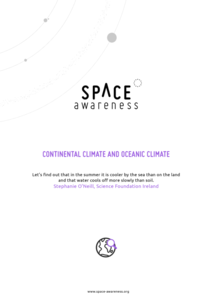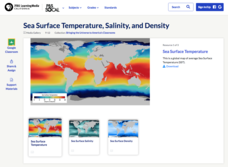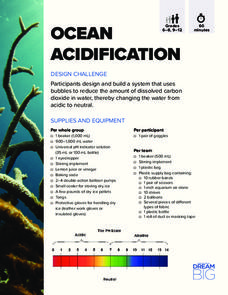American Museum of Natural History
Create a Coral Reef
Scholars create a diorama to showcase a vibrant coral reef. Six steps walk pupils through setting up the diorama box, crafting four different types of marine life, and putting it all together.
American Museum of Natural History
Rubber Blubber Gloves
Using gloves, shortening, tape, and a lot of ice, participants experience the feeling of having blubber. The experiment's eight steps follow an informative page about blubber and animals that have it.
American Museum of Natural History
Crazy Camouflage
Scholars discover the crazy camouflage technique of the flounder fish. After reading three informative paragraphs, participants follow steps to make a model of the sea creature.
Nemours KidsHealth
Water Safety: Grades 9-12
Make a big splash with a lesson about water safety. After reading three articles related to water safety, high schoolers first choose one water safety rule to research and write a report summarizing their findings. They then use an...
NASA
Mapping the Watery Hills and Dales
How does GPS know where everything is located? Pupils read about satellites that are mapping the ocean and the question on how satellites know where they are. Readers discover the workings of the Global Positioning System and create...
American Museum of Natural History
What is Marine Biology?
A marine environment covers the majority of the earth but is arguably the least understood. Teach young scientists about the characteristics of oceans and ocean species using an interactive online lesson. The in-person or remote learning...
American Museum of Natural History
What do You Know About Life on Earth?
Humans have only inhabited the earth for a fraction of the time that life has existed. Young scientists explore the facts about the emergence of life on Earth with an interactive resource. While highlighting different types of life, the...
American Museum of Natural History
What do You Know About Marine Biology
Show me what you know about the sea. Learners answer 10 questions about marine biology. The questions range from what evidence points to the origin of life to the biggest threat to oceans.
American Museum of Natural History
Dive Into Worlds Within the Sea
The ocean is a series of ecosystems within an ecosystem. Learners dive into an exploration of ecosystems in an interactive lesson. They identify connections between organisms by following leading prompts within the lesson. The resource...
Aquarium of the Pacific
Ocean Habitats
Watch what happens in an underwater wonderland! Pupils view a video about two specific ocean habitats and complete a worksheet by placing the fish species into the correct habitat. They then take a deeper look into the ocean habitats by...
National Wildlife Federation
Plastic in the Sea
How much plastic do people use? Class members identify how plastic is involved in their daily lives by looking at food packaging either at a grocery store or at home. Learners view statistics for the amount of plastics found on a beach...
CK-12 Foundation
CK-12 Earth Science Concepts for Middle School
Explore a variety of science concepts in an interactive textbook created for middle school scholars. A lengthy table of contents takes readers to pages comprised of a subject overview, outline, and summary. Follow links further to find...
Space Awareness
Continental Climate and Oceanic Climate
There's nothing better than a cool breeze blowing in from the ocean. Scholars explore how water affects change in temperature using a hands-on experiment on climate. They use measurement tools to compare the continental and oceanic...
NOAA
The Sea with No Shores
Some habitats are more bio-diverse than others. Scholars examine an especially diverse environment as groups research different species in a specific ocean habitat. The class then uses their research to create three-dimensional bulletin...
Discovery Education
Motion in the Ocean
How do temperature changes affect ocean currents? Scholars explore convection currents by demonstrating the flow of water in a baking dish. They use ice, heat, and food coloring to see currents. Then, they draw conclusions about their...
Space Awareness
Meet Our Home: Earth
Earth is a complex structure. Learners explore their home, the earth, using a fun hands-on activity. They create tactile models of the earth using ordinary household materials that represent some common features: land, polar caps,...
College Board
2011 AP® Environmental Science Free-Response Questions
Beetle population, climate change, and acidification are all real environmental threats. Scholars display their knowledge of these threats and offer solution strategies in a four-question assessment resource. Questions from the AP® exam...
Google
Adventure on the High Seas
Ahoy there! A fun computer science lesson plan challenges pupils to write a program that creates an ocean wave. They then develop stories to accompany their projects. All of this takes place within the Scratch coding program.
PBS
Regional Patterns of Climate: Pacific Northwest
Climate systems involve sunlight, ocean, atmosphere, ice, land forms, and many other factors. Scholars explore each of these variables related to the Pacific Northwest rain forest. They use an online interactive to investigate the polar...
PBS
Sea Surface Temperature, Salinity, and Density
Earth's vast ocean is full of mysteries! Science scholars discover the big-picture properties that influence its characteristics at different latitudes using a lesson from PBS's Weather and Climate series. After completing a background...
PBS
The Ocean and Climate: Heat Redistribution
Here on Earth, heat goes with the flow! Young climatologists dive in to the connection between ocean currents and heat distribution during a science lesson. Scholars work with interactive and print resources to create a thorough...
BrainPOP
Latitude and Longitude Differentiated Lesson Plan
Scholars warm-up their map skills with a discussion using location words to describe familiar places. An engaging video informs class members about latitude and longitude. Three leveled activities extend the learning experience for...
DiscoverE
Ocean Acidification
Combat ocean acidification with bubbles. Young engineers create a system that reduces the acidity of water. Dry ice in water helps simulate ocean acidity, and blowing bubbles into the water results in a gas exchange that neutralizes the...
Centers for Ocean Sciences
Ocean and Great Lakes Literacy: Principle 7
Your mission, should you choose to accept it, is to take your class on an underwater adventure. The final installment in a seven-part series involving salt and freshwater bodies takes junior oceanographers below the surface in...

























